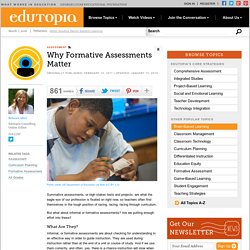

Why Formative Assessments Matter. Summative assessments, or high stakes tests and projects, are what the eagle eye of our profession is fixated on right now, so teachers often find themselves in the tough position of racing, racing, racing through curriculum.

But what about informal or formative assessments? Are we putting enough effort into these? What Are They? Informal, or formative assessments are about checking for understanding in an effective way in order to guide instruction. Justification. Citation. Defining Portfolio Assessment. Justification. Citation. New Page 1. Justification. Citation. Assessment in the Early Childhood Classroom. Curriculum standards define what children should know and be able to do in a particular content area.

Standards provide guidance to teachers and informs their instruction. Teachers can use these curriculum standards to assess what concepts need strengthening or reteaching, or to identify when a new strategy is needed. Standards are organized by grade level to better define what children should know and be able to do at each grade level, and to facilitate developmentally appropriate teaching. When faced with high-stakes testing, teachers often feel pressured to teach material to students before they are ready to learn it, or in ways that are not age appropriate. Justification. Citation. NAEYC Offers Guidance on Early Childhood Assessment « April 5, 2012 by Irene Sege Photo: Alessandra Hartkopf for Strategies for Children Kindergarten entry assessment is a key – and sometimes controversial – component of the federal Race to the Top – Early Learning Challenge (ELC) initiative.

The central question is how to conduct systemic, developmentally appropriate assessment of young children and use the results to inform instruction. Justification. Citation.